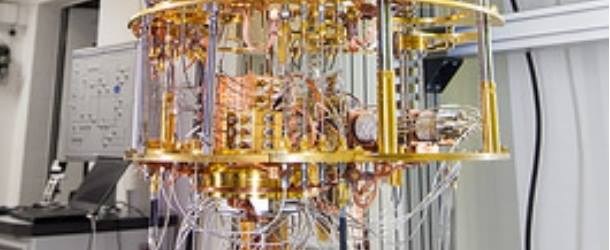Quantum Computers Are Already Helping to Untangle Nature’s Mysteries

(Wired) Some of the world’s top scientists are engaged in a frantic race to find new battery technologies that can replace lithium-ion with something cleaner, cheaper and more plentiful. Quantum computers could be their secret weapon.
It’s a similar story in agriculture, where up to five per cent of the world’s consumption of natural gas is used in the Haber-Bosch process, a century-old method for turning nitrogen in the air into ammonia-based fertiliser for crops. It’s hugely important – helping sustain about 40 per cent of the world’s population – but also incredibly inefficient compared to nature’s own methods. Again, quantum computers could provide the answer.
NOTE: This is a complex article extracted by Wired for Katwala’s book Quantum Computing: How It Works and How It Could Change the World. Summarized here by IQT-News, it’s well worth the time to click through the source and read the entire online article.
So far, researchers have been working on these problems with blunt tools. They can perform increasingly powerful simulations using classical devices, but the more complicated the reactions get, the harder they become for supercomputers to handle. This means that right now, scientists are limited to looking only at very small problems, or they are forced to sacrifice accuracy for speed.
To crack complex problems, chemists, biologists and physicists need to simulate nature – and, exactly as Richard Feynman predicted back in the 1980s, they need computers made from quantum components to help them. In a way, you can think of a quantum computer as a programmable molecule, says Boixo’s Google colleague Marissa Giustina. “It’s a system of many parts that behaves according to the rules of quantum mechanics, like a molecule. You see a path to connect from there to actually programming chemistry in some senses.”
There are three ways in which quantum computers can help improve our understanding of reactions at the molecular level. The first approach involves building a specific computer to model the problem you’re trying to solve – physically recreating the molecule with the right number of qubits corresponding to its actual structure.
The second approach involves implementing algorithms that show how a system changes over time. You input the current state of the system, in the form of its wave function, and the level of energy in the system (known as its Hamiltonian, after the mathematician Sir William Rowan Hamilton) and watch it play out over time.
Solar panels are another area where quantum computers could help, by accelerating the search for new materials. This approach could also help to identify new materials for batteries, and superconductors that work at room temperature, which would drive advances in motors, magnets and perhaps even quantum computers themselves.
The ability to potentially identify new compounds is one reason why the medical industry is excited about quantum computing. We have already seen how quantum computers should be able to process data from MRI scans more efficiently and accurately, but they could also save billions in drug design, by enabling companies to quickly identify new compounds, and then simulate their effects without having to synthesise them.
IN JANUARY 2020, researchers at IBM published an early glimpse of how quantum computers could be useful in the NISQ era. Working with the German car manufacturer Daimler on improving batteries for electric vehicles, they used a small-scale quantum computer to simulate the behaviour of three molecules containing lithium, which could be used in the next generation of lithium-sulphur batteries that promise to be more powerful and cheaper than today’s power cells.
In time, Google’s Sergio Boixo hopes that quantum computers will be able to tackle some of the existential crises facing our planet. “Climate change is an energy problem – energy is a physical, chemical process,” he says.
“Maybe if we build the tools that allow the simulations to be done, we can construct a new industrial revolution that will hopefully be a more efficient use of energy.” But eventually, the area where quantum computers might have the biggest impact is in quantum physics itself.



















